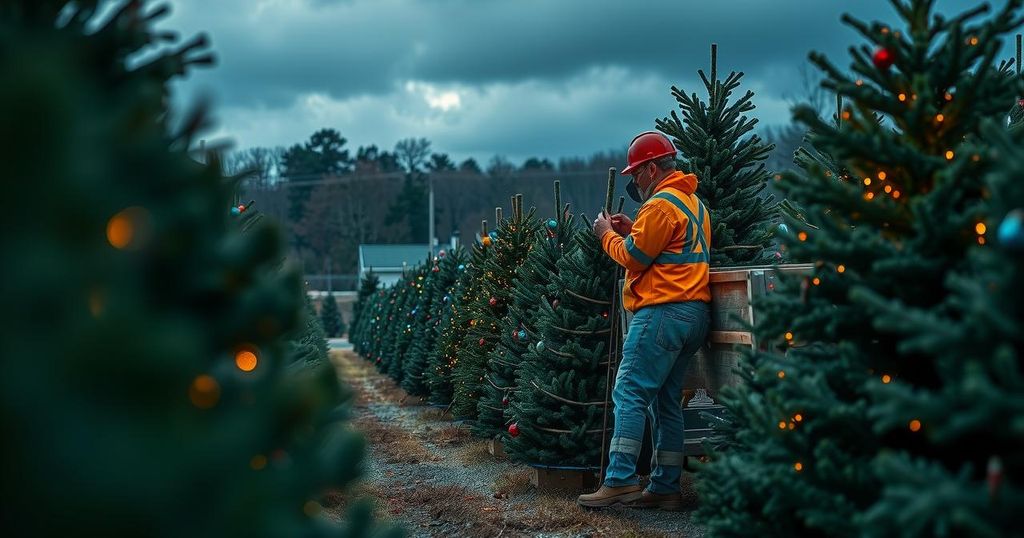Weather
AFRICA, ASH, AVERY, BOOKWAL, CARTNERS CHRISTMAS TREE FARM, CONSERVATION, ENVIRONMENT, EVACUATIONS, FOR BUSINESS, GOVERNMENT FUNDING, JAMIE BOOKWALTER, KO, KOHL, KOHLWAY, NC CHRISTMAS TREE INDUSTRY IS, NC STATE EXTENSION, NORTH CAROLINA, SOUTH AFRICA, TENNESSEE, VIRGINIA, WEATHER, WILDFIRES, WILL KOHLWAY
Jamal Robinson
0 Comments
North Carolina Christmas Tree Industry Thrives Amid Hurricane Helene Recovery
The North Carolina Christmas tree industry continues to operate successfully despite Hurricane Helene’s impact, which included significant losses for some farms. Experts indicate that the supply of Fraser firs remains secure, with prices stable at retail outlets. Growers and agencies are working together to recover from the storm and support future production.
The North Carolina Christmas tree industry is persevering in the wake of Hurricane Helene, which caused considerable damage in the region in late September. While some farms, such as Cartners Christmas Tree Farm in Avery County, experienced significant losses with about 7,000 trees destroyed, experts believe that this will not drastically impact the overall supply of Christmas trees available this season. According to NC State Extension specialist Will Kohlway, growers have diligently worked to prepare for a successful season, asserting, “If someone wants to buy a real Christmas tree that was grown in North Carolina, they’ll be able to find one.”
Fraser firs, the primary species cultivated in North Carolina, are notably resilient and are mainly produced in Alleghany, Ashe, and Avery counties. Approximately 850 growers in the state cultivate over 50 million trees annually, with significant distribution that reaches retailers across the country. Jamie Bookwalter, an expert in mountain conifers, indicated that although Hurricane Helene hindered access to some fields due to road damage, recovery efforts are ongoing through collaboration with various agencies. Fortunately, the harvest is largely on schedule, and notable farms have even supplied trees for prestigious events like the White House’s Christmas celebrations.
Retailers throughout North Carolina will continue to offer a wide selection of Fraser firs into December, even though many consumers traditionally purchase their trees in late November. According to Bookwalter, prices for Fraser firs remain stable, ranging from $65 to $250 depending on the tree size and the selling venue. Consumers are encouraged to support local growers by purchasing Fraser firs at various outlets, including choose-and-cut farms and retail lots. Additionally, those traveling to western North Carolina are advised to verify road conditions prior to their journey. Following the holiday season, experts plan to assess the storm’s impact fully to strategize future growing seasons effectively.
The article discusses the resilience of the North Carolina Christmas tree industry following the destruction caused by Hurricane Helene in late September. This hurricane caused severe flooding and landslides, affecting Christmas tree farms, particularly Cartners Christmas Tree Farm, which suffered significant tree loss. However, experts from NC State emphasize that the overarching supply of Christmas trees will not be majorly impacted, thanks to proactive efforts by local growers. Additionally, the Fraser fir, a predominant tree variety, remains readily available for consumers across various retail formats in North Carolina.
In conclusion, despite the challenges posed by Hurricane Helene, the North Carolina Christmas tree industry is maintaining its production capabilities and supply chain integrity. Experts reaffirm that consumers wishing to buy a genuine North Carolina Christmas tree will have ample options available. Through collaborative efforts among growers and agencies, the industry demonstrates resilience, ensuring stability in both supply and pricing as the holiday season approaches.
Original Source: cnr.ncsu.edu




Post Comment